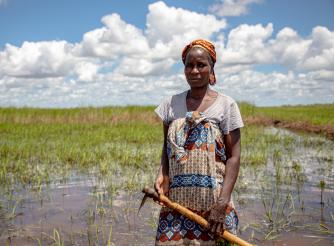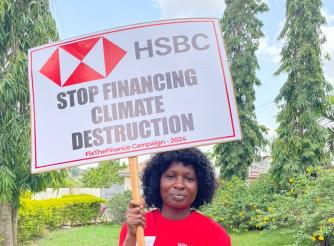ActionAid Zambia: Mining companies must not be allowed to pollute with impunity

Konkola Copper Mines – a subsidiary of the UK-based mining giant Vedanta – has been polluting the main water source of surrounding villages in Chingola, in Zambia’s Copperbelt Province, and leaving a trail of human rights and environmental abuses for nearly two decades.
A legal action, brought by more than 2,500 Zambian villagers, including 643 children, against Konkola Copper Mines Plc and Vedanta Resources Limited, has settled out of court, it was announced today (19 January) in a joint statement from the mining companies and Leigh Day, the English law firm representing the claimants.
ActionAid Zambia works closely with communities in the Chingola area through its partner, the Catholic Diocese of Ndola. This work provides a platform and resources to support villagers to claim their rights and advocate for regulation of corporate conduct through progressive policies and legislation.
Mining companies often avoid paying corporation tax in Zambia and are not being held accountable to national environmental laws.
Responding to the settlement announcement, Nalucha Nganga Ziba, Country Director of ActionAid Zambia, says:
“Communities in Chingola have been fighting for justice and compensation for the human rights abuses and environmental destruction they have suffered for over a decade.
“This case highlights the devastating and deadly impact that polluters like KCM and Vedanta are having on surrounding villages in the Copperbelt.
“Extractive companies must be taxed on their profits, to provide public services to benefit communities, and be made to adhere to environmental standards. There must be no bailouts or public investments in mining companies, which continue to pollute and contribute to climate change. They must no longer be allowed to act with impunity.”
‘Our children are dying’ – extracts from interviews with community activists and claimants Esther and Brenda:
Esther Nalumbulu is from Shimulala where the community’s main water source has been polluted for more than a decade by toxic run-off from the Konkola Copper Mine (KCM). She says this is causing adults to suffer from upset stomachs and skin irritations. But for young children and babies it is proving deadly.
“We are always ill,” she says. “Many children have died. Initially when we noticed a high rise in the deaths of children in the community, we didn’t realise that it was the water killing the children. Unfortunately, the problem has become worse even to this day.”
Esther, a community activist who has received rights training from ActionAid Zambia, says mothers are advised to keep feeding their babies breast milk for as long as possible and to not give them the local water until they’re at least six months old.
If babies do drink the water, Esther says: “The child’s physical health immediately starts to change, and you would even find that the child [could] die.”
The copper mine in Nchanga has been contaminating the local water supply and polluting farmland since 2004.
Esther has letters dating from 2011, from a doctor hired by the mine itself, explaining that the water is not safe for human consumption and that the community is advised not to drink from the stream.
Pollution from the mine has contaminated the local water table. Toxins are killing off crops, livestock and the vegetation surrounding the river, destroying the livelihoods of local people who depended on farming and fishing to support their families.
Women and children are most affected as they are forced to walk long distances making 10km round trips in search of clean water. The older and disabled people unable to walk so far, get sick from drinking the polluted water. Many people are affected by skin conditions due to bathing in the river.
“Women suffer most because they have to fetch water from the streams in the bush,” Esther, explaining they have to walk at least 5-6km to find clean water.
Community activist Brenda Siachipula, 39, is also from Shimulala and has received training on rights from ActionAid Zambia.
She uses social media and appears on local radio stations to raise awareness of the pollution and the impacts it’s having on the community’s health and livelihoods.
“If you go to the mine right now, you will find that they are still releasing the chemical slurry into the stream,” she says. “And when you pass by the steam, the fumes are suffocatingly strong and that is an indication that the mine is operating.”
She says life is a struggle for her community. The pollution has affected the fertility of the soil and is killing livestock.
“The water the cattle are drinking is killing them, just as it is killing the people,” Brenda says. “When the cows give birth, the calf will die shortly afterwards.
“Even though the land is no longer fertile, we try our best to grow as much as we can, so we can sustain our lives and our family’s.”
Brenda says families are struggling to pay school fees for their children: “This pollution has destroyed so many things. There is no point where we can say we are ok. Things are getting worse. We are also failing to educate our children.”
She adds: “In my lifetime I want to see that the community is compensated.”
Ends.
For more information, please contact Jenna Pudelek: Jenna.Pudelek@actionaid.org, +44(0)7795642990


